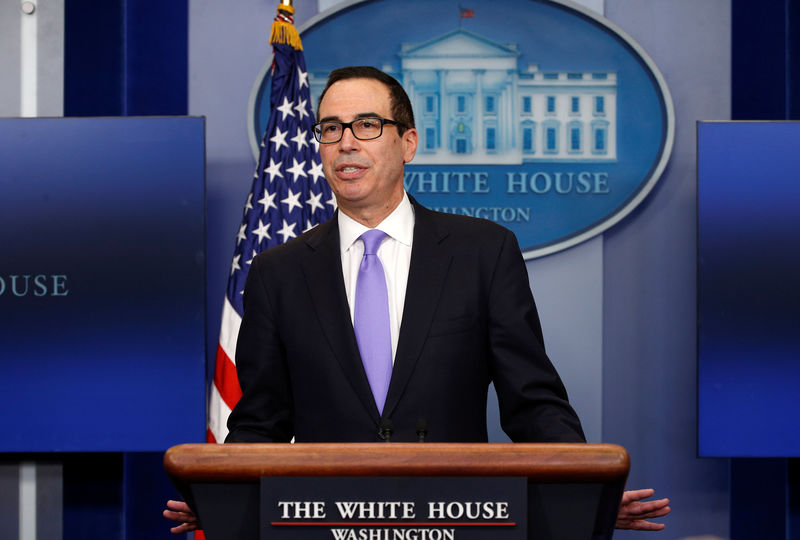By David Lawder
WASHINGTON (Reuters) - U.S. President Donald Trump's first budget proposal will spare big social welfare programs such as Social Security and Medicare from any cuts, Treasury Secretary Steven Mnuchin said in an interview broadcast on Sunday.
Mnuchin said Trump would also use a major policy speech to a joint session of Congress on Tuesday night to preview some elements of his sweeping plans to cut taxes for the middle class, simplify the tax system and make American companies more globally competitive with lower rates and changes to encourage U.S. manufacturing.
Speaking on Fox News Channel's "Sunday Morning Futures" program, Mnuchin, who has acknowledged that tax reform is his top policy priority, said the budget plan would not seek cuts to federal benefits programs known as "entitlements."
"We are not touching those now. So don't expect to see that as part of this budget, OK," Mnuchin said of the programs, according to a transcript provided by Fox. "We are very focused on other aspects and that's what's very important to us. And that's the president's priority."
Trump during his election campaign promised not to cut Social Security, Medicare healthcare for seniors nor Medicaid healthcare for the poor. Preservation of these programs, coupled with a middle-class tax cut, would aid the retirees and working class Americans who make up a significant portion of Trump's political base.
In a transcript of the Fox News Channel interview, Mnuchin said Trump will be "touching on tax reform" in his speech. Mnuchin said the plan would cut the number of tax brackets and "create a level playing field for U.S. companies to be able to compete in the world."
But Wall Street, which has sent stocks to record highs on anticipation of Trump's tax cut plans, has grown impatient and could react negatively to a lack of substantive details about the plan in Trump's speech, financial analysts said.
With both chambers of the U.S. Congress in Republican hands, Trump has the potential to enact major elements of his legislative agenda.
But divisions with the Republican Party over the approach on Obamacare and taxes could prove to be an obstacle. Some Republican lawmakers have urged Trump to lay out more specifics on his policy plans, saying that more White House engagement is needed to build momentum in Congress for his agenda.
'RECIPROCAL TAX'
Mnuchin offered little new information and said key tax plan elements were not yet settled. He said Trump was looking at a "reciprocal tax" that would help create more trade parity with other countries. Trump administration officials have complained that many countries charge value-added taxes on imports while exempting exports from taxation.
But Mnuchin again said he was still "studying very carefully" a House Republican border tax adjustment plan that would levy a 20 percent tax on imports to encourage more U.S.-based production and exports. That plan aims to raise more than $1 trillion in revenue over a decade to offset lower tax rates for businesses.
"There are certain aspects that the president likes about the concept of a border-adjusted tax, there are certain aspects that he's very concerned about," Mnuchin said.
He added that the Trump administration would work with the House of Representatives and Senate to craft "a combined plan that takes the best of all of this when we bring it forward."
In a comment suggesting that Trump's budget and tax plans may use aggressive revenue assumptions, Mnuchin said the administration "fundamentally believes in dynamic scoring," a budget calculation method that assumes that a lower tax burden boosts revenues by encouraging economic activity.

The Congressional Budget Office has previously used mainly "static" scoring methods that assume very conservative economic effects of tax and budget changes.